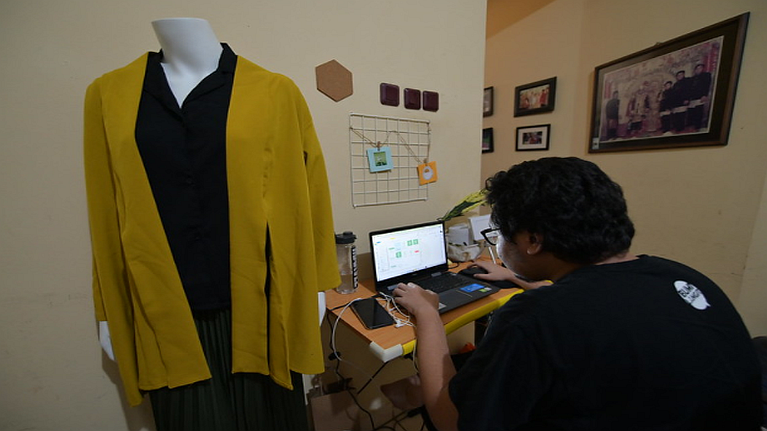Digital marketing helps entrepreneurs expanding businesses
The ILO through a joint UN programme helps vulnerable groups attaining new skills and opening new opportunities in the midst of pandemic.

He started with selling various goods online, particularly phone cases. After graduating from high school this year, his growing interest has made him even passionate in improving his digital marketing skills. He is interested in expanding his digital business.
Today is the digital era, the era of industrial revolution 4.0, where it demands, whether we want it or not, for us to be digital. And the competition today is rough, so to gain a new skill in digital marketing is very useful."
Kenichi Satria Kaffah, 18 years old
“Today is the digital era, the era of industrial revolution 4.0, where it demands, whether we want it or not, for us to be digital. And the competition today is rough, so to gain a new skill in digital marketing is very useful,” Kenichi added.
During the three-day training Kenichi found business analysis using Business Model Canvas (BMC) was useful. He learned how to map his business using nine key elements, covering, among others, resources, product values, price and presentation, as well as customers’ segmentation. “I found the business analysis session was really useful, teaching me to make a more structured plan for my future plan,” he added.
With less educational experience, people with disabilities are facing an uphill battle in obtaining income and getting employment. Therefore, to reduce the gap, we provide training programmes to vulnerable groups to help them attaining new skills and opening new opportunities for more equality and inclusivity."
Kazutoshi Chatani, the ILO’s Project Coordinator for Employment and Livelihood Project
“This creates a wider gap in the workforce. With less educational experience, people with disabilities are facing an uphill battle in obtaining income and getting employment. Therefore, to reduce the gap, we provide training programmes to vulnerable groups to help them attaining new skills and opening new opportunities for more equality and inclusivity,” said Kazutoshi Chatani, the ILO’s Project Coordinator for Employment and Livelihood Project.
To keep up with the technology enhancement, one of the training programmes offered was digital skills. Kenichi was part of the training’s first batch, which so far had trained 65 people, of whom four of them were people with disabilities.

He also hopes that the traineeship could help diminishing stigma against the ability of people with disabilities. “I’m totally blind. When others see me, they question me, can he really? They are wondering how I am going to create content,” he shared. He is now implementing the skills and knowledge attained from the training to help the label improve their online profile and increase their sales.
The digital marketing training programme was part of the whole series of Digital Capacity Development for Eastern Part of Indonesia from June to September 2021, conducted through the Employment and Livelihood project, funded by UN MPTF. Aiming to support economic recovery of vulnerable groups like people with disabilities during COVID-19 pandemic, the ILO is one of the four UN agencies involved in the Project and supports the Leave No One Behind spirit of the Sustainable Development Goals (SDGs).